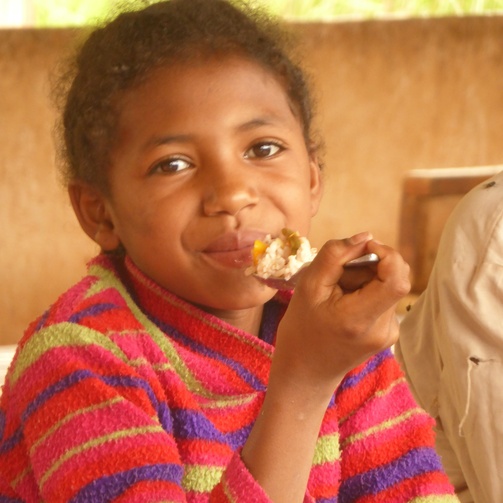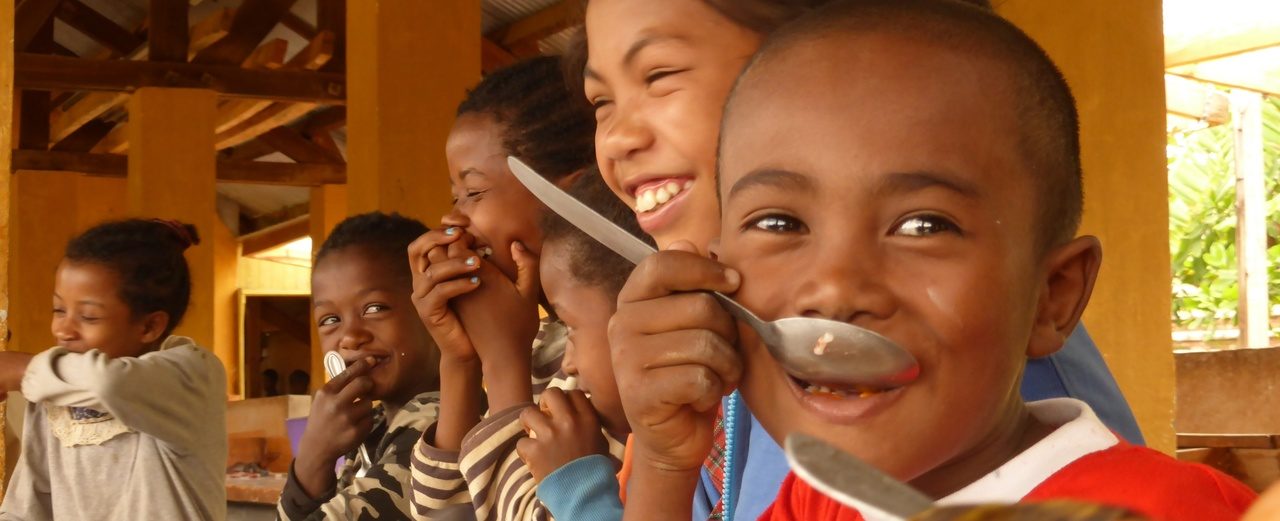 Education is better on a full stomach
Education is better on a full stomach
Meals for pupils in rural Madagascar
Have you ever wanted to “spice up your life”? Then you can look forward to a visit in Madagascar. Beyond the party-happy lemurs from the animated film "Madagascar", many people know little about the former French colony and the fourth largest island in the world. In Madagascar, 18 different ethnic groups live together peacefully, making the island a bridge between Africa and Asia. With its enormous natural and mineral resources, it is also known as the island of spices. Nevertheless, over 80 per cent of Malagasy people live below the poverty line (UNDP, 2018). Two out of every three children in rural Madagascar have no chance of a school education beyond primary school (UNDP, 2018). Many children would have to leave their families and move to the city. Only very few of them can afford this.
Necessity
Daily meals and a safe roof over the heads of schoolchildren in Madagascar.
Activity
Preparing daily meals for schoolchildren at the ALABRI centre.
Countable effort
Number of meals supplied at the ALABRI centre.
Result
The schoolchildren benefit from better nutrition and are better able to focus on their lessons. This results in a higher completion rate and improved education.
Systemic effect
The nutrition and education of the children improves and young people in Madagascar take charge of their own futures.
Background
Almost half of the approximately 26 million Malagasies are minors (UNDP, 2018). Education therefore plays a central role in the country’s development. However, 65 per cent of children drop out of primary school before they complete it (ETVA, 2015). The most frequent reasons are that they have to help out in the fields at home and that they lack the money to attend school. Secondary education is therefore only open to a small number of children and the path is full of obstacles. The children often have to leave their parents at an early age and look for an affordable place to sleep in cities such as Miarinarivo. They are entirely responsible for themselves and their own needs. Inadequate financial resources, lack of medical care and having no one to ask for advice are challenges that these pupils must face on a regular basis.
The good deed
Your donation today will be used to finance three balanced meals for one schoolchild in the ALABRI centre. The meals and the boarding house ensure the basic needs of the children. In addition to the balanced meals, children get a roof over their heads and access to medical care. Also, there are extracurricular activities such as homework supervision, language development, sports, culture, vocational counselling and the sustainable cultivation of food that help to bring pupils together and prepare them for their future daily lives.

AboutMadagascar
Antananarivo
Capital
25,600,000
Number of inhabitants
1,358
Gross domestic product per capita per year
Placed 161 of 189
Human Development Index
The world’s largest exporter of vanilla. Because of its singular diversity of animals and plants, it is often referred to as a mini continent.
About the organization and further information
Association
Ny Hary Deutschland Verein zur Förderung der Jugendbildung auf Madagaskar e.V.
Website
Initiative Transparente Zivilgesellschaft

Further information and source
- Human Development Reports, 2018. Country Profile Madagaskar.
- ETVA (Enquête sur la transition des jeunes vers la Vie Active), 2015. Rapport de synthèse.
- Stefan Büschelberger, März 2019, Projektbericht.
- Zukunft Madagaskar, 2018, Bericht über Kooperation, Ny Hary, Aufbau des Zentrums ALABRI.
- Zukunft Madagaskar, 2018, Bericht über Kooperation.




